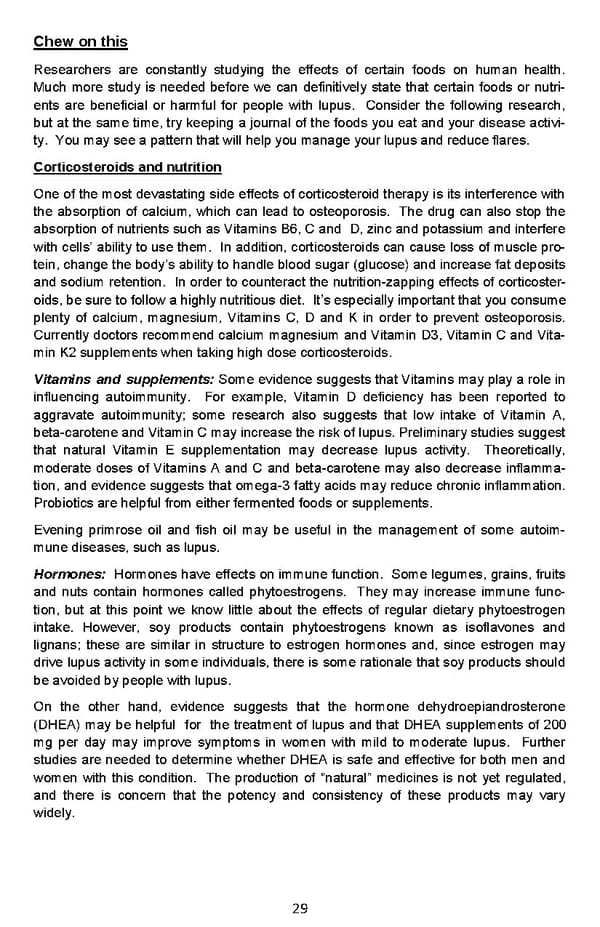Chew on this Researchers are constantly studying the effects of certain foods on human health. Much more study is needed before we can definitively state that certain foods or nutri- ents are beneficial or harmful for people with lupus. Consider the following research, but at the same time, try keeping a journal of the foods you eat and your disease activi- ty. You may see a pattern that will help you manage your lupus and reduce flares. Corticosteroids and nutrition One of the most devastating side effects of corticosteroid therapy is its interference with the absorption of calcium, which can lead to osteoporosis. The drug can also stop the absorption of nutrients such as Vitamins B6, C and D, zinc and potassium and interfere with cells’ ability to use them. In addition, corticosteroids can cause loss of muscle pro- tein, change the body’s ability to handle blood sugar (glucose) and increase fat deposits and sodium retention. In order to counteract the nutrition-zapping effects of corticoster- oids, be sure to follow a highly nutritious diet. It’s especially important that you consume plenty of calcium, magnesium, Vitamins C, D and K in order to prevent osteoporosis. Currently doctors recommend calcium magnesium and Vitamin D3, Vitamin C and Vita- min K2 supplements when taking high dose corticosteroids. Vitamins and supplements: Some evidence suggests that Vitamins may play a role in influencing autoimmunity. For example, Vitamin D deficiency has been reported to aggravate autoimmunity; some research also suggests that low intake of Vitamin A, beta-carotene and Vitamin C may increase the risk of lupus. Preliminary studies suggest that natural Vitamin E supplementation may decrease lupus activity. Theoretically, moderate doses of Vitamins A and C and beta-carotene may also decrease inflamma- tion, and evidence suggests that omega-3 fatty acids may reduce chronic inflammation. Probiotics are helpful from either fermented foods or supplements. Evening primrose oil and fish oil may be useful in the management of some autoim- mune diseases, such as lupus. Hormones: Hormones have effects on immune function. Some legumes, grains, fruits and nuts contain hormones called phytoestrogens. They may increase immune func- tion, but at this point we know little about the effects of regular dietary phytoestrogen intake. However, soy products contain phytoestrogens known as isoflavones and lignans; these are similar in structure to estrogen hormones and, since estrogen may drive lupus activity in some individuals, there is some rationale that soy products should be avoided by people with lupus. On the other hand, evidence suggests that the hormone dehydroepiandrosterone (DHEA) may be helpful for the treatment of lupus and that DHEA supplements of 200 mg per day may improve symptoms in women with mild to moderate lupus. Further studies are needed to determine whether DHEA is safe and effective for both men and women with this condition. The production of “natural” medicines is not yet regulated, and there is concern that the potency and consistency of these products may vary widely. 29
 Living Well With Lupus Facts Booklet Page 28 Page 30
Living Well With Lupus Facts Booklet Page 28 Page 30